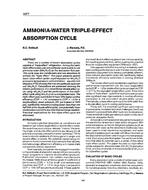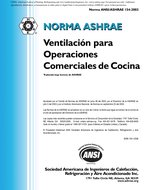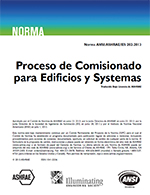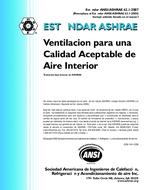Description
There are a number of known absorption cycles capable of “triple-effect” refrigeration. Among the basic triple-effect cycles only one particular cycle is able to use ammonia-water (NH3/H2O) as the absorption fluid pair. This cycle uses two condensers and two absorbers to achieve the “triple effect”. This paper presents several basic triple-effect cycles superimposed on NH3/H2O pressure-temperature-concentration equilibrium diagrams (PTX) showing that only one particular cycle can use NH3/H2O. Calculations are presented showing the relative performance of a conventional double-effect cycle using NH3/H2O and the performance of this triple-effect cycle using NH3/H2O on a comparable basis. The triple-effect cycle is predicted to have 18% higher cooling efficiency (COP = 1.41 compared to COP = 1.2 for a double-effect), lower pressure (701 psi instead of 1000 psi), significantly reduced pumping power (less than one half that of the double-effect cycle), and potentially lower construction cost (33% less total heat exchange needed). Practical implications for this triple-effect cycle are discussed.
KEYWORDS: absorption refrigeration, refrigeration, ammonia, water, performance, absorption air conditioning, air conditioning.
Citation: ASHRAE Transactions, vol.96, pt. 1, Atlanta, 1990
Product Details
- Published:
- 1990
- Number of Pages:
- 7
- File Size:
- 1 file , 1000 KB
- Product Code(s):
- D-18453




